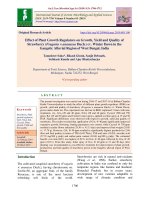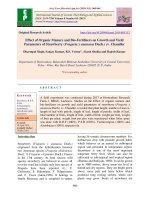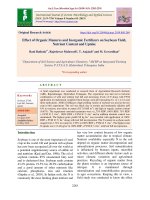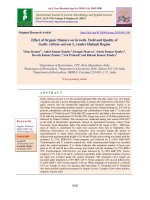Effect of organic manures and bio-fertilizers on floral and commercial yield characters of strawberry (Fragaria × ananassa Duch.) cv. Chandler
Bạn đang xem bản rút gọn của tài liệu. Xem và tải ngay bản đầy đủ của tài liệu tại đây (176.16 KB, 6 trang )
Int.J.Curr.Microbiol.App.Sci (2019) 8(2): 392-397
International Journal of Current Microbiology and Applied Sciences
ISSN: 2319-7706 Volume 8 Number 02 (2019)
Journal homepage:
Original Research Article
/>
Effect of Organic Manures and Bio-Fertilizers on Floral and Commercial
Yield Characters of Strawberry (Fragaria × ananassa Duch.) cv. Chandler
Aman Srivastav*, Rajaneesh Singh, Hari Baksh, Bijendra K. Singh, Raj pandey,
Vishal Kumar Pal and Lawlesh Kumar Maurya
Department of Horticulture, TilakDhari Post Graduate College,
Jaunpur (U.P.) - 222 002, India
*Corresponding author
ABSTRACT
Keywords
Vermicompost,
Organic manure,
Azotobacter,
Benefit cost ratio,
Net income
Article Info
Accepted:
04 January 2019
Available Online:
10 February 2019
A field study was conducted on the Experimental Unit, Department of Horticulture, Tilak
Dhari Post Graduate College, Jaunpur during 2017-18 to study the effect of organic
manure and bio-fertilizers on floral and commercial yield characters of strawberry
(Fragaria × ananassa Duch.) cv. Chandler. The runners of strawberry were transplanted
in the last week of October with a spacing of 40×40 cm. The experiment was laid out in
Randomized Block Design with ten treatments replicated thrice. Maximum number of
runners/plant (6.77) and maximum number of crowns/plant (5.16) were reported in
treatment Vermicompost + Azotobacter+ PSB, while minimum number of runners/plant
(2.87) and crowns/plant (2.39) were recorded in control (untreated plants). Minimum days
to produce first flower (50.99 days) was recorded in treatment FYM + Vermicompost +
Poultry manure + Azotobacter + PSB, while maximum days to produce first flower (60.79
days) was recorded in control (untreated plants). Duration of harvesting (63.75 days),
number of flowers/plant (59.91) and number of fruit set/plant (49.60) were recorded
highest in treatment FYM + Vermicompost + Poultry manure + Azotobacter+ PSB. Fruit
set percentage/plant (84.05%) were recorded highest in treatment Vermicompost. Days to
fruit set (6.47 days) was recorded minimum in treatment FYM + Vermicompost+ Poultry
manure + Azotobacter + PSB, while all floral characters were found minimum in control.
Maximum yield/plant (290.56 g), maximum yield/plot (2.90 kg) and maximum yield/ha
(145.26 qt) was recorded in treatment Vermicompost + Azotobacter+ PSB while minimum
yield was found in control. Benefit cost ratio maximum is found in FYM +Azotobacter +
PSB treatment and maximum net income maximum was found in Vermicompost +
Azotobacter + PSB treatment.
family Rosaceae and is native to America
(Galletta et al., 1990). Strawberry is an
herbaceous perennial short day plant. It was
first introduced by the NBPGR Regional
Research Station, Shimla (Himachal Pradesh)
Introduction
Strawberry (Fragariax ananassa Duch.) is
one of the most delicious, refreshing and
nutritious soft fruits of the world. It belongs to
392
Int.J.Curr.Microbiol.App.Sci (2019) 8(2): 392-397
in the early sixties. Strawberry is one of the
important temperate fruit of India but also
being grown in sub-tropical and tropical
climates. It can be grown up to 12,000 feet
from mean sea level in humid and dry
regions. Its successful cultivation requires an
optimum day temperature of 22-23°C and
night temperature of 7-13°C in India. It is
excellent sources of natural antioxidants
including carotenoids vitamins, phenols,
flavonoids, dietary glutathionine endogenous
metabolites and exhibit a high level of
antioxidant capacity against free radical
species (Wang and Jiao, 2000). It is cultivated
to a limited extent is plains and sub
mountainous areas of Himachal Pradesh,
Uttarakhand, Uttar Pradesh, Maharashtra,
Karnataka, Punjab, Haryana and Madhya
Pradesh, wherever, irrigation facilities are
available in India.
Bio-fertilizers are naturally occurring
products with living microorganisms which
are resulted from the roots or cultivated soil
and don’t have any ill effect on plants, soil
health and environment. Biofertilizer viz.
Azotobacter, PSB are the derived product of
living microorganism that are capable to
fixing atmospheric nitrogen and also convert
insoluble phosphorus to soluble phosphorus
for uptake of plants, and it can also increase
fertility of soil and increases number and
biological activities. Besides, their role in
fixing atmospheric nitrogen and phosphorous
solubilisation, these are also helpful in
stimulating the plant growth hormones.
Materials and Methods
The present investigation was carried out at
the Experimental Unit of the Department of
Horticulture, TilakDhari Post Graduate
College, Jaunpur, Uttar Pradesh, India during
year 2017-18. Runners of strawberry cv.
Chandler were procured from Dr. Y.S. Parmar
University of Horticulture and Forestry,
Nauni, (Solan), H.P. The climatic condition of
Jaunpur is subtropical with three distinct
seasons i.e., winter, summer and rainy.
During the winter season (December-January)
temperature fall, 5oC or even low, while in
summer season (May-June) it reaches as high
as 45oC. Occasional spell of frost and
precipitation may occur during winter. The
mean temperature is minimum 15-20 0C and
maximum18-32 0C, maximum relative
humidity 95% and minimum 55% with annual
rainfall of 850-1100mm. The strawberry
runners of uniform size were transplanted 2-5
cm depth at a spacing of 40×40 cm. in last
week of October. FYM, Vermicompost,
Poultry Manure, Azotobacter and PSB were
applied in the concerned plots as per the
treatment. The treatments viz., T1 -Control
(Untreated), T2 - Farm Yard Manure, T3 Vermicompost, T4 - Poultry Manure, T5 Azotobacter, T6 - PSB (Phosphorus
Organic substance improve Physical and
chemical Soil characters, prevent soil
degradation and increase beneficial important
micro organisms. Organic fertilizers improved
strawberries yield due to their essential
elements, vitamins, enzymes and hormone.
Many studies have confirmed that application
of organic manure to strawberry fields
improved plant nutrition and stimulate plant
growth (Hargreaves et al., 2009). Uses of
organic manures are environmentally safe and
viable alternatives of chemical fertilizers and
it increases microbial biomass in the soil
(Selvamani et al., 2011). Flowering date
advanced by organic matter, while it was
delayed in the conventional treatment, while
the highest fruit weight and total yield/plant
were produced in conventional treatment
(Abu-Zahra and Tahboub, 2008). Herencia et
al., (2011) reported that composts contained
nitrogen and phosphorus which enhanced
vegetative growth and flower bud initiation.
Singh et al., (2008) found significant increase
in fruit yield and flowering of strawberry with
vermicompost based fertilizer.
393
Int.J.Curr.Microbiol.App.Sci (2019) 8(2): 392-397
Solublizing Bacteria), T7-FYM + Azotobacter
+ PSB, T8-Vermicompost +Azotobacter +
PSB, T9-Poultry Manure + Azotobacter +
PSB, T10-FYM + Vermicompost + Poultry
Manure + Azotobacter + PSB were evaluated
in Randomized Block Design with three
replications. The required quantity of organic
manures as per treatments was applied at the
time of land preparation. Azotobactor,
phosphorus solubilising bacteria solutions
were made by dissolving 50 ml + 500 gm of
juggery in 20 litres of water. The roots of the
strawberry runners were thoroughly dipped in
the solution for about 30minutes and then
planting were done. Blackpolythene of 200
gauges was used as mulch material. Other
cultural practices like weeding, hoeing,
irrigation,
insect
pest
and
disease
management were done as and when required.
Azotobacter+ PSB treatment with followed by
Vermicompost + Azotobacter + PSB(52.99
days) alone treated plants. However, the
maximum number of days to produce first
flower (60.79 days) was recorded in the plants
which were untreated i.e. control. These
results have got the support of the findings of
Kumar et al., (2015), who recorded earliest
flowering with Vermicompost + PSB and
Vermicompost + Azotobacter treatments in
strawberry. From the table 1 it is clear that
maximum number of flowers/plant (59.91)
was recorded in FYM + Vermicompost +
Poultry manure + Azotobacter + PSB treated
plants followed by Vermicompost +
Azotobacter + PSB (58.93), whereas the
minimum number of flowers/plant was
observed in the control (40.77). Increased
number of flowers might have also resulted
because of increase in number of
crowns/plant. Similar observations were also
reported by Tripathi et al., (2010) in
strawberry, who found that higher dose of
Azotobacter and PSB (7 kg/ha) increased
number of flowers/plant and also Kumar et
al., (2015) in strawberry.
The observations were recorded on five
randomly selected plants from each treatment
to assess the effect of organic manures and
bio-fertilizer on floral and commercial yield
character in strawberry cv. chandler. Floral
characters [Daysto produce first flower,
number of flowers/plant, days to fruit set,
number of fruit set/plant, percentage of fruit
setting/plant and duration of harvesting
(days)] and yield/plant (g), yield/plot (kg) and
yield/ha (qt) in strawberry. The data recorded
during the course of investigation were
analyzed by analysis of variance (ANOVA)
using the statistical program and the
significance differences between the mean
were tested against the critical difference at
5% probability level.
The minimum number of days to fruit set
(6.47 days) were recorded in plants treated
with FYM + Vermicompost + Poultry manure
+ Azotobacter + PSB followed by
Vermicompost + Azotobacter + PSB
(6.93days), whereas, the unfertilized plants
(control) took maximum days (10.99 days) for
fruit setting. These results have got the
support of the findings of Kumar et al.,
(2015), who recorded earliest flowering with
Vermicompost + PSB in strawberry. From the
table 1 it is obvious that number of fruit/plant
(49.60) were observed maximum when the
plants treated with FYM + Vermicompost+
Poultry manure Azotobacter + PSB which
were significantly to Vermicompost+
Azotobacter + PSB treatment (48.68),
whereas, the least number of fruit/plant
(29.55) was obtained from control. Maximum
Results and Discussion
Floral characters
Mean data presented in table 1 clearly show
that minimum number of days to produce first
flower (50.99 days) was recorded in FYM +
Vermicompost + Poultry manure +
394
Int.J.Curr.Microbiol.App.Sci (2019) 8(2): 392-397
fruit set percentage (84.05%) was found in
Vermicompost followed by (82.79%) in FYM
+ Vermicompost +Poultry manure +
Azotobacter + PSB, whereas, minimum fruit
set percentage (72.46%) in untreated i.e.
control. However, no such reports are
available from the literature and thus warrant
further studies. Duration of harvesting was
significantly increased with organic manure
and bio-fertilizer applications. From the table
1 maximum duration of harvesting
(63.75days) was observed when the plants
were treated with FYM + Vermicompost +
Poultry manure + Azotobacter+ PSB,
followed by (62.74 days) in Vermicompost
+Azotobacter + PSB treatment, whereas
minimum in control (47.46 days).
Table.1 Effect of organic manure and bio-fertilizers on floral characters of strawberry
cv. chandler
Treatment
T1
T2
T3
T4
T5
T6
T7
T8
T9
T10
CD at 5%
Days to produce
first flower
Number of
flower/plant
Days to
fruit set
Number of
fruit/plant
Percentage of fruit
setting/plant
Duration of
Harvesting
(days)
60.79
55.57
53.46
58.64
59.03
59.29
54.12
52.99
55.65
50.99
0.719
40.77
51.71
56.42
49.23
45.19
44.27
54.61
58.93
51.44
59.91
0.651
10.99
8.95
7.53
9.59
9.66
9.99
8.21
6.93
9.06
6.47
0.404
29.55
41.57
47.42
38.02
36.44
34.75
44.48
48.68
38.61
49.60
0.871
72.46
80.38
84.05
77.23
80.64
78.50
81.46
82.59
75.06
82.79
1.803
47.46
54.61
60.48
51.88
50.61
49.67
57.51
62.74
53.09
63.75
0.602
Table.2 Effect of organic manure and bio-fertilizers on yield/plant, yield/plot and
yield/ha of strawberry cv. Chandler
Treatment
T1
T2
T3
T4
T5
T6
T7
T8
T9
T10
CD at 5%
Yield/plant (g)
143.99
258.67
276.93
252.81
189.53
171.71
272.96
290.56
256.61
287.45
0.995
Yield/plot (kg)
1.44
2.58
2.76
2.52
1.89
1.71
2.72
2.90
2.56
2.87
0.010
395
Yield/ha (qt)
71.98
129.31
138.43
126.38
94.73
85.83
136.46
145.26
128.28
143.71
0.487
Int.J.Curr.Microbiol.App.Sci (2019) 8(2): 392-397
Table.3 Economics of the different treatments per hectare in Strawberry cv. Chandler
Treatment
Treatment
cost (Rs.)
Total cost
(Rs.)
Yield/ha
(qt)
Gross income
(Rs.)
Net income
(Rs.)
B:C Ratio
T1
T2
T3
T4
T5
T6
T7
T8
T9
T10
00000.00
12000.00
70000.00
10000.00
600.00
1250.00
13850.00
71850.00
11850.00
32517.00
174000.00
186000.00
244000.00
184000.00
174600.00
175250.00
187850.00
245850.00
185850.00
206517.00
71.98
129.31
138.43
126.38
94.73
85.83
136.46
145.26
128.28
143.71
2159400.00
3879300.00
4152900.00
3791400.00
2841900.00
2574900.00
4093800.00
4357800.00
3848400.00
4311300.00
1985400.00
3693300.00
3908900.00
3607400.00
2667300.00
2399650.00
3905950.00
4111950.00
3662550.00
4104783.00
11.41/1
19.85/1
16.02/1
19.60/1
15.27/1
13.69/1
20.79/1
16.72/1
19.70/1
19.87/1
Similar results were also recorded by Jain et
al., (2017) Tripathi et al., (2010) and Singh
and Singh (2009) in strawberry, who got
advanced duration of harvesting (earliness) by
approximately one month which obviously
extended the period of harvesting.
Benefit cost ratio
Data presented the table 3 it is clear that
during the investigation. The maximum
benefit: cost ratio (20.79:1) was recorded
from treatment FYM + Azotobacter + PSB,
which was followed by treatment FYM +
Vermicompost + Poultry manure +
Azotobacter +PSB (19.87:1). Maximum net
income was also obtained from treatment
Vermicompost
+
Azotobacter
+PSB
(41,11,950.00 Rs.) followed by treatment
FYM +Vermicompost + Poultry manure
+Azotobacter+ PSB (41,04,783 Rs.). The
minimum benefit: cost ratio (11.41:1) and net
income (19,85,400 Rs.) was observed from
control. Similar results were reported by
Yadav et al., (2010) and Jain et al., (2017).
Yield
It was observed from the table 2 that organic
manures and bio-fertilizers have given
remarkable increase in the yield of strawberry
fruits. The maximum yield/plant (290.56 g),
yield/plot (2.90 kg) and yield/ha (145.26 qt)
was recorded in the plant treated
Vermicompost + Azotobacter + PSB followed
by yield/plant (287.45 g), yield/plot (2.87 kg)
and yield/ha (143.71 qt) in FYM +
Vermicompost + Poultry manure +
Azotobacter + PSB fertilized plants, whereas,
the minimum yield/plant (143.99 g),
yield/plot (1.44 kg) and yield/ha (71.98 qt)
was recorded in control. These findings are in
line with the Kumar et al., (2015) and Jain et
al., (2017) in strawberry, who reported the
capability of vermicompost and poultry
manure in producing growth hormone,
enzymes, antifungal and antibacterial
compounds, which in turns enhanced
marketable yield over other treatments.
References
Abu-Zahra, T. R. and Tahboub, A. A. (2008).
Strawberry (Fragaria x anansa Dutch.)
growth, flowering and yielding as
affected by different organic matter
sources. Intern. J. of Botany, 4 (4): 481485.
Galletta, G. J., Lawrence, F. J. and Scott, D.
H. (1990). Strawberry breeding work of
the United States Department t of
Agriculture. Hort. Sci., 25: 895-896.
396
Int.J.Curr.Microbiol.App.Sci (2019) 8(2): 392-397
Hargreaves, J. C., Adl M. S. and Warman, P.
R. (2009). Are compost teas an
Effective nutrient amendment in the
cultivation of strawberries? Soil and
plant tissue effects. J. Sci. Food Agric.
89: 390-397.
Herencia, J. F., Garcia-Galavisa, P. A.,
Doradoa, J. A. R. and Maqueda, C.
(2011). Comparison of nutritional
quality of the crops grown in an organic
and conventional fertilized soil. Sci.
Hort. 129(4): 882–888.
Jain, N., Mani, A., Kumari, S., Kasera, S. and
Bahadur, V. (2017). Influence of INM
on yield, quality, shelf life and
economics of cultivation of strawberry
(Fragaria ×ananassa Duch.) cv. Sweet
Charlie. Journal of Pharmacognosy and
Phytochemistry, 6 (5): 1178-1181.
Kumar, N., Singh, H. K. and Mishra, P. K.
(2015). Impact of Organic Manures and
Biofertilizers on Growth and Quality
Parameters of Strawberry cv. Chandler.
Indian Journal of Science and
Technology, 8(15): 1-6.
Selvamani, P., Manivannan, K. and Jagan, M.
(2011). Impact of organic manures,
inorganic fertilizers and bio-fertilizers
on the nutrient concentration in soil at
different growth stages of banana cv.
Poovan Mysore (Aab) (Musa pp. L.).
Plant Archives,11: 165–168.
Singh, A. and Singh, J. N. (2009). Effect of
biofertilizers and bioregulators on
growth, yield and nutrient status of
strawberry cv. Sweet Charlie. I. J.
Hort., 66: 220-224.
Singh, R., Sharma, R. R., Kumar, S., Gupta,
R. and Patil, R. T. (2008).
Vermicompost substitution influences
the physiological disorders, fruit yield
and quality of strawberry (Fragaria
ananassa Duch). Bioresource Technol.
99:8507–11.
Tripathi, V. K., Kumar, N., Shukla, H. S. and
Mishra, A. N. (2010). Influence of
Azotobacter, Azospirillum and PSB on
growth, yield and quality of strawberry
cv. chandler. Abst: National Symposium
on Conservation Hort., p. 198-199.
Wang, S. Y. and Jiao, H. (2000). Scavenging
capacity of berry crops on superoxide
radicals, hydrogen-peroxide, hydroxyl
radicals, and singlet oxygen. J. Agr.
Food Chem. 48: 5677–86.
Yadav, S. K., Khokhar, U. U. and Yadav, R.
P.
(2010).
Integrated
nutrient
management for strawberry cultivation.
Ind. J Hort. 67(4): 445-449.
How to cite this article:
Aman Srivastav, Rajaneesh Singh, Hari Baksh, Bijendra K. Singh, Raj pandey, Vishal Kumar
Pal and Lawlesh Kumar Maurya. 2019. Effect of Organic Manures and Bio-Fertilizers on
Floral and Commercial Yield Characters of Strawberry (Fragaria × ananassa Duch.) cv.
Chandler. Int.J.Curr.Microbiol.App.Sci. 8(02): 392-397.
doi: />
397









